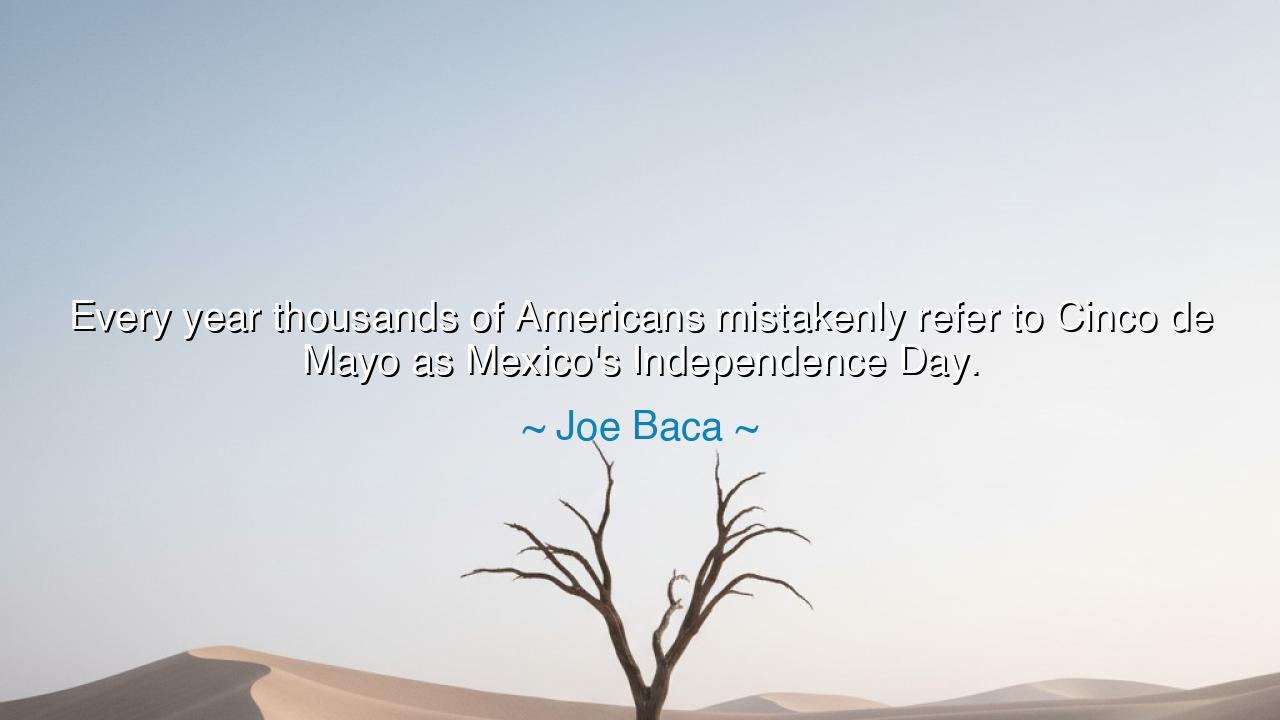
Every year thousands of Americans mistakenly refer to Cinco de
Every year thousands of Americans mistakenly refer to Cinco de Mayo as Mexico's Independence Day.






The Truth Behind Celebration and the Memory of Nations
Hear the words of Joe Baca, a servant of history and truth, who spoke not to criticize but to remind:
“Every year thousands of Americans mistakenly refer to Cinco de Mayo as Mexico’s Independence Day.”
This simple sentence, though spoken in modern times, carries the gravity of an ancient warning. It is a call to remembrance—a plea that we not allow joy to outshine truth, nor festivity to replace knowledge. For in this misunderstanding lies a greater reflection of the human heart: our tendency to celebrate the image of freedom while forgetting the story that gave it birth. Cinco de Mayo and Mexico’s Independence Day are not the same, and to confuse them is to blur the difference between a battle and a birth, between victory and liberation.
The Meaning Behind the Confusion
To understand Baca’s words, we must see beyond the surface. Cinco de Mayo, the Fifth of May, commemorates the Battle of Puebla in 1862, when a small and under-equipped Mexican army triumphed against the might of French forces. It was not the beginning of independence, but a symbol of courage—a moment when Mexico, though divided and weary, stood defiant against imperial ambition. It was an act of resistance, not the dawn of sovereignty.
Mexico’s true Independence Day, however, is celebrated on September 16, the anniversary of the Grito de Dolores—the cry for freedom that began in 1810 under Miguel Hidalgo, a priest who dared to call his people to rise against Spanish colonial rule. His cry was not just for land or law—it was for dignity, identity, and destiny. Between those two dates lies the difference between a single victory and an entire revolution, between a fleeting triumph and the rebirth of a nation.
The Origin of a Misunderstanding
The confusion that Baca laments did not arise from malice, but from time, distance, and simplification. In the United States, Cinco de Mayo grew to be celebrated not as a national holiday of Mexico, but as a symbol of Mexican-American pride—a day of cultural remembrance for a people whose roots cross borders. Over the years, commerce, music, and festivity transformed it into a colorful celebration, yet stripped it of its original meaning.
Thus, the misunderstanding became a mirror—a reflection of how easily culture can be honored in form yet forgotten in essence. To confuse Cinco de Mayo with Independence Day is to forget that freedom is not won in one battle, nor is it born in a moment of chance. It is forged across generations, through struggle, sacrifice, and spirit.
The Spirit of Puebla and the Cry of Hidalgo
Yet let us not scorn the celebrations, for even in error there may be truth. The Battle of Puebla, though not a war of independence, stands as a testament to the courage of the oppressed. When General Ignacio Zaragoza led his men against the French, he fought not for conquest, but for the right of his nation to determine its own fate. His victory reminded the world that even a small army, united in purpose, can overcome an empire.
But when Hidalgo’s cry first echoed through the dawn of September 16, 1810, it was the beginning of a far greater flame—the birth of Mexican Independence, which would burn for over a decade before the nation finally freed itself from Spain. The two events, though distant in years, are bound by a common thread: the eternal struggle for self-determination, the refusal to bow before foreign power.
The Lesson of Memory and Meaning
Joe Baca’s words are a reminder that to honor a people, we must first honor their truth. Celebration without understanding is like a flame without oil—it burns bright but fades quickly. To remember correctly is to give life to those who came before, to give them not only applause but acknowledgment. For a nation’s history is not a parade—it is a sacred inheritance.
So let us teach and learn, that every Cinco de Mayo may be celebrated for what it is—a symbol of bravery—and every September 16 remembered for what it represents—the birth of freedom. For the two, though different, belong to the same spirit of endurance that defines the Mexican people.
The Ancient Parallel
In this, there is an echo of all nations and all peoples. The Greeks celebrated their victories at Marathon, yet remembered their liberty from tyranny through the rise of democracy. The Americans rejoiced at Yorktown, but traced their independence to July 4, when the Declaration was signed. Every civilization has its Puebla and its Dolores, its moments of resistance and its moments of rebirth. To confuse them is to forget how history unfolds—one victory at a time, toward a destiny earned, not given.
So, too, must every generation learn anew the price of freedom and the power of memory. For to forget the origins of one’s liberty is to risk losing the meaning of liberty itself.
The Call to Understanding
Thus, Joe Baca’s statement stands not as correction but as invitation—to learn, to remember, to honor. Let the festivals continue, but let wisdom walk among them. Let the music play, but let the voice of Hidalgo and the valor of Zaragoza be heard above the drums. Let us celebrate not merely with joy, but with gratitude—for joy is fleeting, but gratitude endures.
And so, my children of the present age, take this lesson into your hearts: know what you celebrate, and celebrate what you know. For memory, when joined with truth, becomes heritage; and heritage, when joined with reverence, becomes the foundation upon which nations endure.






AAdministratorAdministrator
Welcome, honored guests. Please leave a comment, we will respond soon